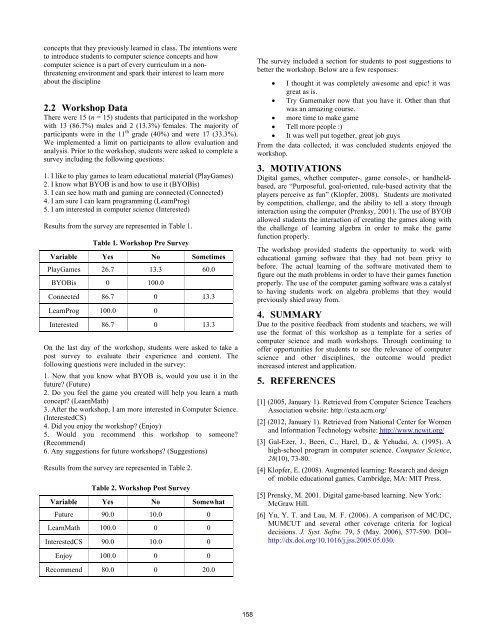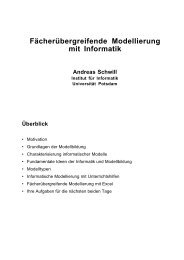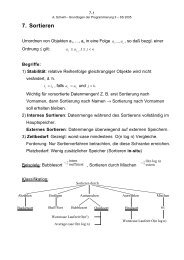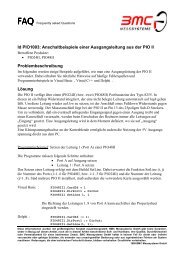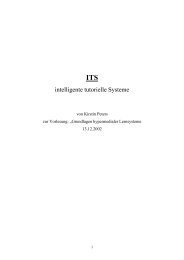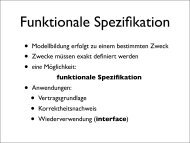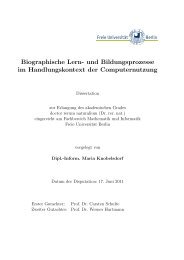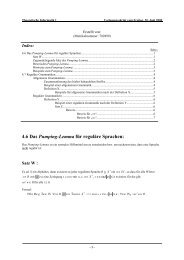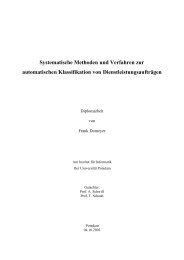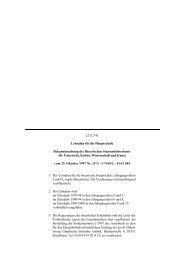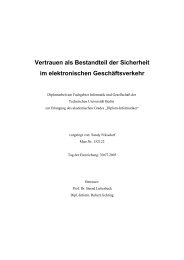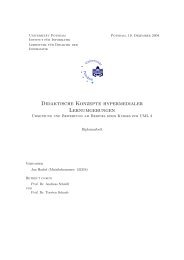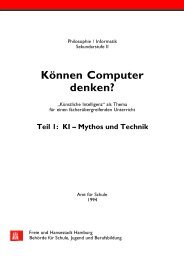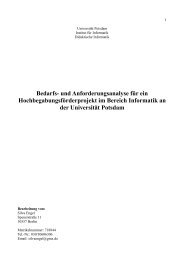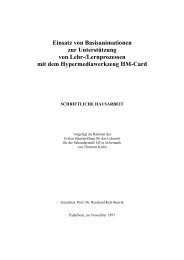Maria Knobelsdorf, University of Dortmund, Germany - Didaktik der ...
Maria Knobelsdorf, University of Dortmund, Germany - Didaktik der ...
Maria Knobelsdorf, University of Dortmund, Germany - Didaktik der ...
Create successful ePaper yourself
Turn your PDF publications into a flip-book with our unique Google optimized e-Paper software.
concepts that they previously learned in class. The intentions were<br />
to introduce students to computer science concepts and how<br />
computer science is a part <strong>of</strong> every curriculum in a non-<br />
threatening environment and spark their interest to learn more<br />
about the discipline<br />
2.2 Workshop Data<br />
There were 15 (n = 15) students that participated in the workshop<br />
with 13 (86.7%) males and 2 (13.3%) females. The majority <strong>of</strong><br />
participants were in the 11 th grade (40%) and were 17 (33.3%).<br />
We implemented a limit on participants to allow evaluation and<br />
analysis. Prior to the workshop, students were asked to complete a<br />
survey including the following questions:<br />
1. I like to play games to learn educational material (PlayGames)<br />
2. I know what BYOB is and how to use it (BYOBis)<br />
3. I can see how math and gaming are connected (Connected)<br />
4. I am sure I can learn programming (LearnProg)<br />
5. I am interested in computer science (Interested)<br />
Results from the survey are represented in Table 1.<br />
Table 1. Workshop Pre Survey<br />
Variable Yes No Sometimes<br />
PlayGames 26.7 13.3 60.0<br />
BYOBis 0 100.0<br />
Connected 86.7 0 13.3<br />
LearnProg 100.0 0<br />
Interested 86.7 0 13.3<br />
On the last day <strong>of</strong> the workshop, students were asked to take a<br />
post survey to evaluate their experience and content. The<br />
following questions were included in the survey:<br />
1. Now that you know what BYOB is, would you use it in the<br />
future? (Future)<br />
2. Do you feel the game you created will help you learn a math<br />
concept? (LearnMath)<br />
3. After the workshop, I am more interested in Computer Science.<br />
(InterestedCS)<br />
4. Did you enjoy the workshop? (Enjoy)<br />
5. Would you recommend this workshop to someone?<br />
(Recommend)<br />
6. Any suggestions for future workshops? (Suggestions)<br />
Results from the survey are represented in Table 2.<br />
Table 2. Workshop Post Survey<br />
Variable Yes No Somewhat<br />
Future 90.0 10.0 0<br />
LearnMath 100.0 0 0<br />
InterestedCS 90.0 10.0 0<br />
Enjoy 100.0 0 0<br />
Recommend 80.0 0 20.0<br />
158<br />
The survey included a section for students to post suggestions to<br />
better the workshop. Below are a few responses:<br />
� I thought it was completely awesome and epic! it was<br />
great as is.<br />
� Try Gamemaker now that you have it. Other than that<br />
was an amazing course.<br />
� more time to make game<br />
� Tell more people :)<br />
� It was well put together, great job guys<br />
From the data collected, it was concluded students enjoyed the<br />
workshop.<br />
3. MOTIVATIONS<br />
Digital games, whether computer-, game console-, or handheldbased,<br />
are “Purposeful, goal-oriented, rule-based activity that the<br />
players perceive as fun” (Klopfer, 2008). Students are motivated<br />
by competition, challenge, and the ability to tell a story through<br />
interaction using the computer (Prenksy, 2001). The use <strong>of</strong> BYOB<br />
allowed students the interaction <strong>of</strong> creating the games along with<br />
the challenge <strong>of</strong> learning algebra in or<strong>der</strong> to make the game<br />
function properly.<br />
The workshop provided students the opportunity to work with<br />
educational gaming s<strong>of</strong>tware that they had not been privy to<br />
before. The actual learning <strong>of</strong> the s<strong>of</strong>tware motivated them to<br />
figure out the math problems in or<strong>der</strong> to have their games function<br />
properly. The use <strong>of</strong> the computer gaming s<strong>of</strong>tware was a catalyst<br />
to having students work on algebra problems that they would<br />
previously shied away from.<br />
4. SUMMARY<br />
Due to the positive feedback from students and teachers, we will<br />
use the format <strong>of</strong> this workshop as a template for a series <strong>of</strong><br />
computer science and math workshops. Through continuing to<br />
<strong>of</strong>fer opportunities for students to see the relevance <strong>of</strong> computer<br />
science and other disciplines, the outcome would predict<br />
increased interest and application.<br />
5. REFERENCES<br />
[1] (2005, January 1). Retrieved from Computer Science Teachers<br />
Association website: http://csta.acm.org/<br />
[2] (2012, January 1). Retrieved from National Center for Women<br />
and Information Technology website: http://www.ncwit.org/<br />
[3] Gal-Ezer, J., Beeri, C., Harel, D., & Yehudai, A. (1995). A<br />
high-school program in computer science. Computer Science,<br />
28(10), 73-80.<br />
[4] Klopfer, E. (2008). Augmented learning: Research and design<br />
<strong>of</strong> mobile educational games. Cambridge, MA: MIT Press.<br />
[5] Prensky, M. 2001. Digital game-based learning. New York:<br />
McGraw Hill.<br />
[6] Yu, Y. T. and Lau, M. F. (2006). A comparison <strong>of</strong> MC/DC,<br />
MUMCUT and several other coverage criteria for logical<br />
decisions. J. Syst. S<strong>of</strong>tw. 79, 5 (May. 2006), 577-590. DOI=<br />
http://dx.doi.org/10.1016/j.jss.2005.05.030.


